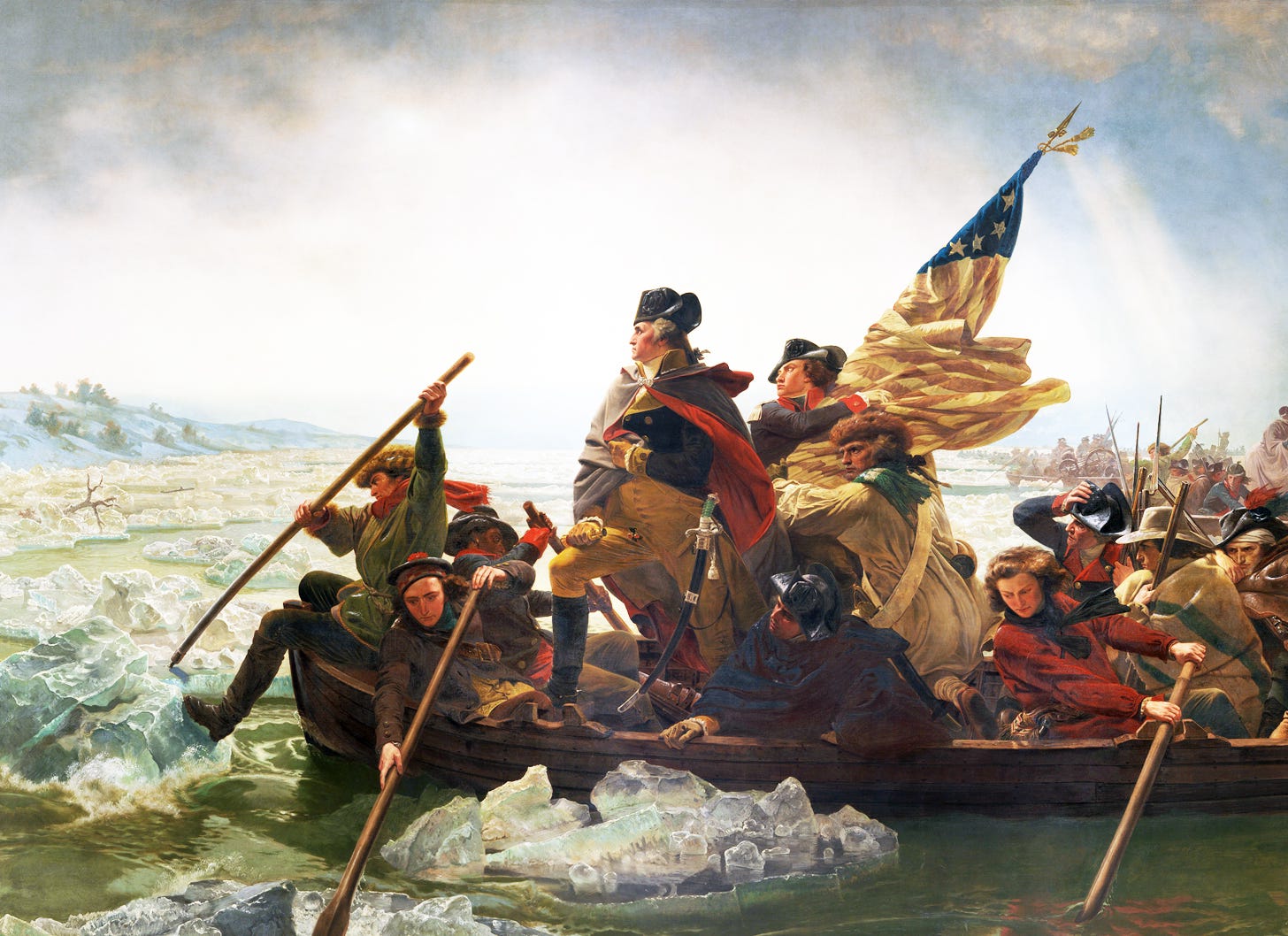Have We Forgotten What Greatness Is?
Sometimes it makes history. Usually it's hidden.

The Indispensable, Invincible Man
Here and there in history you find a figure with a superhuman reputation. Yet usually a closer look at such a person provides a reality check. Often, some of their legendary exploits turn out to be exaggerated.
From afar, history’s great men and women seem almost mythological. Up close, they usually appear all too human.
But there are exceptions.
One of George Washington’s biographers called him “the indispensable man” of the American founding. That is to say, without him, the republic might never have come about—or endured. Washington is that rare historical figure whose legendary status holds up to scrutiny. That’s not to say every story we tell about him is true. It’s a made-up tale, for example, that he chopped down a cherry tree and confessed to it by saying, “I cannot tell a lie.”
Yet some of his real feats sound like fiction:
Washington had two horses shot out from under him in the Battle of Monongahela in 1755. The same engagement, in the French and Indian War, also left four musket-ball holes in his coat.
Throughout that same war, he suffered from bouts of dysentery. In other words, he had to dodge gunfire on horseback while dealing with diarrhea.
He rode within 30 yards of British troops firing on him during the 1777 Battle of Princeton.
He led 2,400 troops across the Delaware River on Christmas night, 1776. The waters were filled with treacherous ice chunks, and the weather was vicious. “It blew a perfect hurricane,” as one soldier put it.
He endured the winter of 1777–1778 in Valley Forge with his troops, as 1 in 4 of them died of starvation or disease.
The Power of Restraint
Despite his seeming invincibility, the ultimate example of Washington’s greatness was something that he didn’t do:
He refused to be king.
After the tide turned and the Americans won the Revolutionary War, Washington refused to become a monarch. Today, we take this fact for granted. But at the time, claiming such power was the expected next step for a victorious general. Some legislators even supported the idea of giving him absolute power.
Yet by the end of that year, Washington had resigned his military commission. “Having now finished the work assigned me, I retire from the great theatre of action,” he told Congress.
While he may have stepped away from the battlefield, Washington’s role in shaping the new nation had just begun. Widely regarded as the only leader who could hold the young republic together, Washington went on to serve two terms as president.
And then he chose not to run again.
At the time, in 1797, there was nothing in the Constitution stopping him from seeking a third term. Nor did the American people expect him to step down. Yet he still chose to give up his power. In response, an astonished King George III called Washington “the greatest character of the age.”
Avoiding False Choices, Acknowledging Flaws
Are we still astonished by those who surrender their power? Are we willing to grapple with the implications?
As Christians, like people generally, we can set up a false choice when we think about power and influence. One group will elevate passivity and caution, emphasizing scriptures about making peace or waiting on the Lord. Another faction will point to verses about courage, boldness, and action. Washington is a great example of a man who wasn’t hesitant to use his extraordinary strengths and was comfortable wielding influence. But he also understood the forgotten virtue of knowing when to lay his own power down for a greater good.
Washington was an extraordinary man, but not a flawless one. His decision to free his slaves only upon his death seems like timid foot-dragging today. As believers, we can admire his habit of pointing out the “wondrous works of Providence” in his life, but we should also be leery of his long involvement with Freemasonry. Suffice it to say that historians have found it difficult to pin down his exact religious convictions.
Hidden Greatness
We do, of course, know another story of a man who surrendered his power:
Have this mind among yourselves, which is yours in Christ Jesus, who, though he was in the form of God, did not count equality with God a thing to be grasped, but emptied himself, by taking the form of a servant, being born in the likeness of men. And being found in human form, he humbled himself by becoming obedient to the point of death, even death on a cross. Therefore God has highly exalted him and bestowed on him the name that is above every other name, so that at the name of Jesus every knee should bow, in heaven and on earth and under the earth, and every tongue confess that Jesus Christ is Lord, to the glory of God the Father.
Philippians 2:5–11
Washington’s willingness to lay down power gave us a republic—if we can keep it.
Jesus’ surrender yielded eternal life for all who believe.
As followers of Christ, our lives are a puzzling mix of here-and-now concerns intertwined with our heavenly hope. As the nations rage and the kingdoms of this earth totter, it’s a good time to remember that your first citizenship is not of this world.
It’s also a good time to ask the Lord what He could be asking you to sacrifice. What power or control might you need to surrender? Don’t underestimate the significance of honoring God in this area of your life.
Countless acts of greatness, as it turns out, are unknown to the history books. The unseen sacrifices in our simple lives might not seem important. But they reflect the character of the God of all greatness, who dwells within us and rejoices as we quietly carry on.


